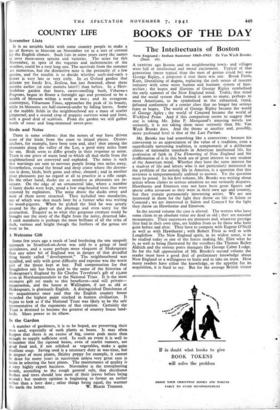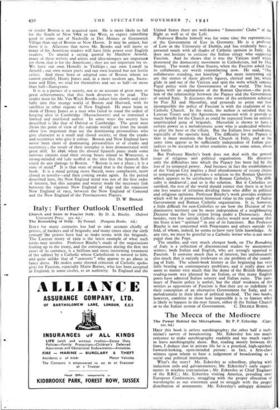BOOKS OF THE DAY
The Intellectuals of Boston
New England : Indian Summer 1865-1915 By Van Wyck Brooks. (Dent. 18s.
A CENTURY ago Boston and its neighbouring town and villages were full of intellectual and moral excitement. Typical of that generation (more typical than the men of genius could be) was George Ripley, a projector if ever there was one. Brook Farm, Kant, liberalising of dogma, replacing the cash nexus of nascent industry with some more human and humane system of hier- archies ; the hopes and illusions of George Ripley symbolised the early summer of the New England mind. Today, that mind and the social system that formed it seem to many, perhaps to most Americans, to be symbolised in the exhausted, timid, defeated conformity of a rentier class that no longer has serious fears or hopes. The world of George Ripley became the world of George Apley ; the world of Concord became the world of Wickford Point. And if this comparison seems to suggest that one is taking Mr. John P. Marquand's amusing novels too seriously, it is not taking them more seriously than Mr. Van Wyck Brooks does. And the theme at another and, possibly, more profound level is that of the Last Purittm.
Mr. Brooks has had something like a conversion ; because his conversion to an appreciation of the value of a tradition, even a superficially narrowing tradition, is symptomatic of a deliberate choice of nationalist standards in American intellectual life, his profession of faith in The Flowering of New England and his reaffirmation of it in this book are of great interest to any student of the American mind. Whether they have the same interest for a student of life and letters who is not particularl4 interested in the problem of the artistic life in America, is a question that this reviewer is temperamentally unfitted to answer. Yet the question must be posed. In his first volume, Mr. Brooks was writing about artists whose claims to serious attention no one seriously disputes. Hawthorne and Emerson may not have been great figures sub specie orbis terrarum as they were in their own age and country, but they remain permanently interesting artists. We are not interested in them for the light they throw on life in Salem or Concord ; we are interested in Salem and Concord for the light they throw on Hawthorne and Emerson.
In the second volume the case is altered. The writers who have some claim to an absolute value are dead or old ; they are national monuments. Their successors are imitators and, whatever prestige they had in their own time, are hidden from us by those who have gone before and after. They have to compete with Eugene O'Neill as well as with Hawthorne ; with Robert Frost as well as with Longfellow. The New England spirit, in its widest sense, is to be studied today as one of the forces making Mr. Eliot what he is, as well as being illustrated by the versifiers like Thomas Bailey Aldrich and the serious poets manques like George Cabot Lodge. So for the full appreciation of Mr. Brooks's second volume the reader must have a good deal of preliminary knowledge about New England or a willingness to learn and to take on trust. How many readers have either the knowledge, or the appetite for its acquisition, it is lard to say. But for the average British visitor
or reader Boston is an acquired taste. He is more likely to fall for the South or New Irdrk or the West, to expect something good to come out of Nashville or Des Moines or Greenwich Village than out of Boston or New Haven. It may be unjust, but there it is. Allusions that move Mr. Brooks and will move so many of his American readers will have little power over English readers. To amend a saying quoted by Matthew Arnold, many of these writers and artists and idea-mongers are important for them, that is for the Americans - they are not important for us. We have our own Howells in Trollope ; our own Lowell in Arnold ; our own minor poets and our own learned but not fertile critics. And those born or adopted sons of Boston whom we cannot parallel, Henry James and, in a more modern age, Santa- yana and Eliot, we read for themselves and see as half—or more than half—Europeans.
It is as a picture of a society, not as an account of great men or great achievements, that this book deserves to be read. The reader must let Mr. Van Wyck Brooks induct him slowly and care- fully into this strange world of Boston and Harvard, with its satellites in other regions of New England. He must learn to think of Henry James as a man who failed to stand the ordeal of keeping alive in Cambridge (Massachusetts) and so remained a limited and mutilated author. In some ways the society here described is like that of Oxford or Cambridge. The great men (from the point of view of the outside world) are from the inside often less important than are the dominating personalities who give character to a small and closed society, or than the cranks and eccentrics who give it colour. Boston and New England have never been short of dominating personalities or of cranks and eccentrics ; the result of their interplay is here demonstrated with great skill. In 1898, when the absurd Spanish panic made some nervous citizens send their strong boxes inland to Worcester, a strong-minded old lady scoffed at the idea that the Spanish fleet could do any damage to Boston. " Boston is not a place ; it is a state of mind.° It is that state of mind that is the theme of this book. It is a mind getting more flaccid, more complacent, more closed to novelty—and then coming awake again. In the period described here, the New England mind was not of the first order of interest, but this autumn and winter made the necessary link between the vigorous New England of 1840 and the renascent New England of 1915, between the New England of Concord and the New England of the Provincetown Players.
D. W BROGAN























 Previous page
Previous page